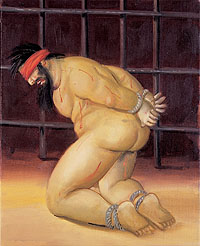UC Berkeley Web Feature
Botero's Abu Ghraib exhibit closes after 15,000 visitors view his images of torture and humiliation
BERKELEY – The paintings and sketches by Colombian artist Fernando Botero of the abuses at Abu Ghraib prison in Iraq may have been hard for many viewers to stomach but, nevertheless, nearly 15,000 visitors flocked to see them during their seven-week exhibit at UC Berkeley's Doe Library.
 Abu Ghraib painting by Fernando Botero |
The exhibit sponsored by UC Berkeley's Center for Latin American Studies (CLAS) closed on Friday, March 23, and heads next to Milan, Italy, for a showing at American University in Washington, D.C., in November, and in Monterey, Mexico, after that.
Botero's works on Abu Ghraib have been shown in museums throughout Europe, but the Botero exhibit at UC Berkeley, arranged at the urging of CLAS Director Harley Shaiken, was the first at any museum in the United States. It elicited international news coverage.
As the exhibit closed, Shaiken said the images of torture and humiliation focused attention on the war in Iraq and facilitated intense campus debate on various aspects of human rights, terrorism, fascism, violence and art. UC Berkeley, home to the Free Speech Movement, was the perfect host for the exhibit and related discussions, he said.
Author Isabel Allende, a native of Chile, attended the exhibit's opening and wrote in the guest book, "Thank you for holding the mirror up to us."
Juan Pablo Mercado, a UC Berkeley graduate in Chicano Studies who is working on an honors thesis, staffed the exhibit from its inception and helped coordinate a cadre of about 30 unpaid student volunteers.
"Ninety-nine point nine percent of the people who walked through there were really touched by the magnitude of the art and very thankful that the university did this," Mercado said. "People were really proud of the exhibit and felt that UC Berkeley was the right place to show this."
One visitor's remarks lingered for Mercado. The man said he had been traveling throughout the Middle East and Africa, and reported that Iraqis felt devastated by what happened at Abu Ghraib. They likely would be surprised and touched to learn of the compassion and concern for human welfare conveyed by the exhibit, he told Mercado.
David Collier, a UC Berkeley professor of political science and an authority on Latin America, commended Shaiken for his audacity, courage and imagination in bringing the Botero exhibit to campus. Because of the UC Berkeley exhibit, the Abu Ghraib collection is "very much in demand" across the country, he said.

